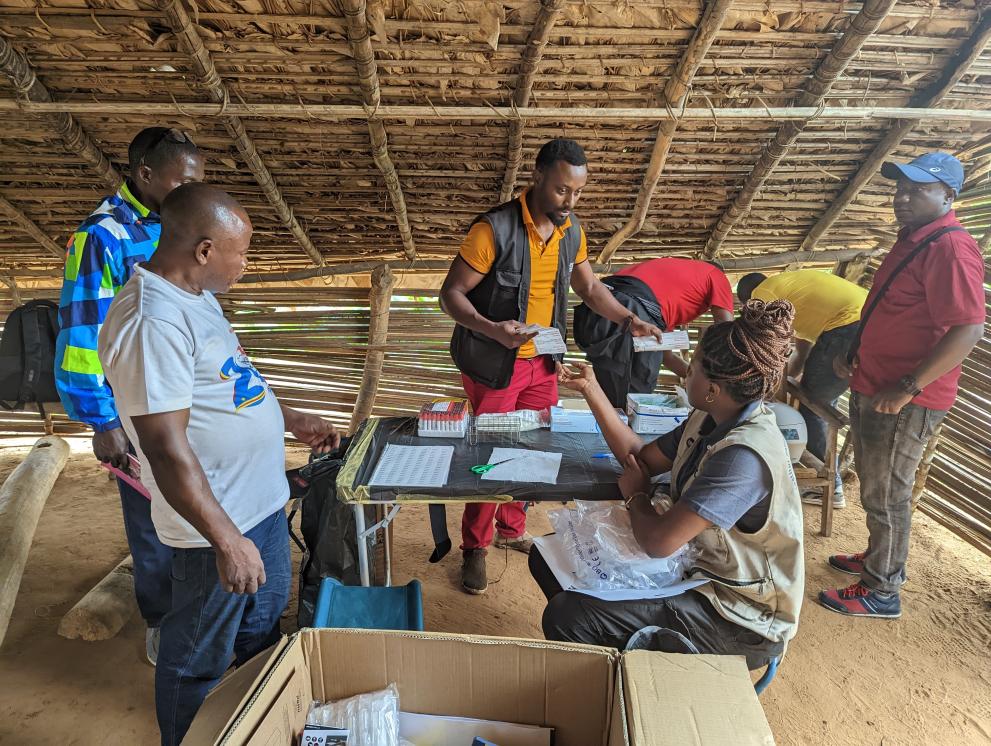
The outbreak, fuelled by dense populations, limited healthcare access and intense cross-border movement, posed a risk of further national and international spread. Without swift action, the world risked a new wave of infections.
In August 2024, the Global Health EDCTP3 emergency funding mechanism enabled the launch of the MBOTE-SK project, a rapid-response initiative designed to contain this alarming outbreak. But MBOTE-SK did not start from scratch. Instead, it stands as proof of how emergency funding can amplify the knowledge and tools developed in earlier projects, ensuring that past investments translate into faster, stronger responses to new threats.
Lessons from Maniema
Two years earlier, in 2022, the MBOTE consortium investigated a large outbreak of mpox in the southern Maniema province, DRC. The MBOTE-Maniema project brought together the NGO ALIMA, the National Institute of Biomedical Research (INRB) in DRC, and the Institute of Tropical Medicine (ITM) in Antwerp, Belgium. The research and operational response was initially supported by the European Commission’s DG ECHO, the Belgian Directorate-General for Development Cooperation and Humanitarian Aid (DGD) and the Flemish Fund for Scientific Research (FWO).
The MBOTE-Maniema project gave the researchers much-needed experience to tackle other mpox outbreaks. Therefore, when they heard of the worrying outbreak in South Kivu, they immediately started an investigation, which led to the first descriptions of the rapidly spreading clade Ib variant.
'Years of Belgian support and long-standing collaboration with partners in the DRC prepared us to respond quickly when clade Ib appeared in South Kivu. MBOTE-SK turns that experience into action: combining medical care, outbreak tracking, and genetic analysis to steer the response and protect communities. It shows how investing in science and partnerships pays off when new health threats arise’ says Professor Laurens Liesenborghs, head of the Unit of Clinical Emerging Infectious Diseases at ITM.
‘This field research program is still teaching us more about this disease, despite our long experience in combating Mpox and other threats such as Ebola, plague, yellow fever, and many others. So, when clade Ib emerged, we were ready to face it head-on, while remaining humble and continuing to learn about Mpox and its new variant to provide valuable data to the scientific community,’ says Placide Mbala-Kingebeni, Head of Epidemiology and Global Health Department at the Institut National de Recherche Biomedicale Du Zaire, Democratic Republic of Congo.
Scaling up with emergency funding
When the South Kivu outbreak erupted, the foundation laid in Maniema proved invaluable. With support from the Global Health EDCTP3 emergency funding mechanism, the new MBOTE-SK project could be launched in record time. Coordinated by ITM Antwerp and led scientifically by INRB, the consortium now brings together partners from DRC, France, Canada, Switzerland and the US.
Armed with the lessons of Maniema, MBOTE-SK researchers were able to hit the ground running, deploying existing tools to monitor the outbreak, investigate transmission routes, and protect vulnerable groups. The emergency funding made it possible to mobilise resources rapidly and ensured that earlier work was not lost but rather scaled and adapted to a new crisis.
Why continuity matters
MBOTE-SK shows how research continuity, strategic partnerships and sustained investment can transform how the world responds to emerging health threats. By linking past and present projects under a common cause, the emergency funding mechanism of Global Health EDCTP3 proves that today’s urgent actions can stand on the shoulders of yesterday’s efforts.
This success story is not only about stopping an outbreak in South Kivu; it is about building resilience for the future. With each project, tools are refined, networks strengthened, and knowledge deepened, leaving the world better prepared for whatever comes next.
Details
- Publication date
- 30 September 2025
- Author
- Global Health EDCTP3 Joint Undertaking